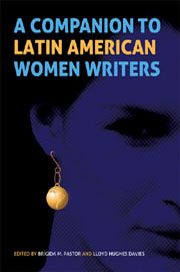Book contents
- Frontmatter
- Contents
- Introduction: The Feminine Voice in Latin American Literature
- 1 Sor Juana Inés de la Cruz (1648/51?–1695)
- 2 Gertrudis Gómez de Avellaneda (1814–1873)
- 3 Gabriela Mistral (1889–1957)
- 4 Alfonsina Storni (1892–1938)
- 5 Silvina Ocampo (1903–1993)
- 6 Clarice Lispector (1920–1977)
- 7 Rosario Castellanos (1925–1974)
- 8 Elena Poniatowska (1933– )
- 9 Alejandra Pizarnik (1936–1972)
- 10 Luisa Valenzuela (1938– )
- 11 Isabel Allende (1942– )
- 12 Rosario Ferré (1938– )
- 13 Laura Esquivel (1950– )
- 14 Laura Restrepo (1950– )
- Conclusion
- Bibliography
- Index
9 - Alejandra Pizarnik (1936–1972)
Published online by Cambridge University Press: 05 February 2013
- Frontmatter
- Contents
- Introduction: The Feminine Voice in Latin American Literature
- 1 Sor Juana Inés de la Cruz (1648/51?–1695)
- 2 Gertrudis Gómez de Avellaneda (1814–1873)
- 3 Gabriela Mistral (1889–1957)
- 4 Alfonsina Storni (1892–1938)
- 5 Silvina Ocampo (1903–1993)
- 6 Clarice Lispector (1920–1977)
- 7 Rosario Castellanos (1925–1974)
- 8 Elena Poniatowska (1933– )
- 9 Alejandra Pizarnik (1936–1972)
- 10 Luisa Valenzuela (1938– )
- 11 Isabel Allende (1942– )
- 12 Rosario Ferré (1938– )
- 13 Laura Esquivel (1950– )
- 14 Laura Restrepo (1950– )
- Conclusion
- Bibliography
- Index
Summary
Tal vez las palabras sean lo único que existe
en el enorme vacío de los siglos
que nos arañan el alma con sus recuerdos. (Pizarnik, 1993: 46)
[It may be that words are all that exist in the vast emptiness of the centuries which claw the soul with their memories.]
En mí el lenguaje es siempre un pretexto para el silencio. Es mi manera de expresar mi fatiga inexpresable.
(Pizarnik, 1993: 191)[For me, language is always a pretext for silence. It is my way of expressing my inexpressible fatigue.]
No poet has captured with such intensity the paradox that words are all we have and yet, because of the fraught nature of language, the process of communication is problematic. In the lines cited above, Alejandra Pizarnik attests to this dilemma directly, and in the process foregrounds one of the central tensions which run through her entire work: the problem of expression itself, and the extent to which language is an effective conduit to express the complexity of human thoughts and emotions. And yet her work reverberates with a pathos and intensity of feeling whereby any logic of the text is attenuated and utterly at the service of the emotions expressed. It comes as little surprise that she has been compared to Sylvia Plath, as both poets explore the inner solipsistic suffering world of the poetic subject to the virtual exclusion of the surrounding world.
- Type
- Chapter
- Information
- A Companion to Latin American Women Writers , pp. 137 - 148Publisher: Boydell & BrewerPrint publication year: 2012



